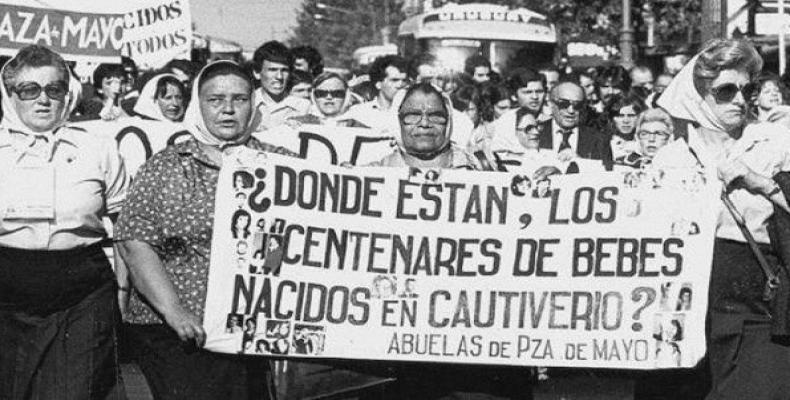Buenos Aires, May 3 (RHC)-- On April 30, 1977, a group of women met in the Plaza de Mayo in front of the Casa Rosada, the seat of government in the center of Argentina’s capital Buenos Aires, after the disappearance of their children. That meeting occurred while there was a state of siege and the meetings of more than three people were forbidden, and they were forced to leave the square by the police. This is how the March of the Mothers and Grandmothers of the Plaza de Mayo was born.
They were accused of being "crazy" but their struggle to know what had happened to their children remained alive to this day. On more than one occasion they suffered repression from on the hands of security forces of the military dictatorship, again and again, they were violently removed from the Plaza.
"They are worth it, the lives of our children were also worth it. Never is the blood of the people useless. The blood is sown and our children are everywhere, fighting and fighting," said Hebe de Bonafini, president of the Mothers Association of Plaza de Mayo according to Andes news agency.
One of her phrases "The only struggle that is lost is that which is abandoned" reflects their dedication to the cost as the mothers never accepted an economic reparation or compensation from the Argentinean state for the death of their children. They have already carried out 2090 marches through the Plaza de Mayo. Although they are between 85 and 95 years old by now, still every Thursday at 3:30 p.m. local time they perform this symbolic act, around the pyramid of the square at the center of Buenos Aires.
Over the years, their struggle for truth and justice for their children expanded to include other social causes concerning Argentina and the region, joining struggles of teachers and social organizations. For them, the 30,000 disappeared in the Argentine dictatorship are their children, because it is a collective fight not individual, they are defenders of human rights and sought to sanction these murders in the courts.
Because of its creation, the Mothers have planned to take out their historical archive so that the citizens know, there will be a tour of the House of Mothers and also a photographic exhibition. One of their most recognizable projects is the Popular University of the Mothers of Plaza de Mayo which was inaugurated on April 6, 2000 with the presence of representatives of the University of Salamanca of Spain, the Martin Luther King Institute of Cuba, as well as various intellectuals from Latin America.
The institution was born with the aim of opening a space for the popular sectors to participate in the construction of knowledge and dispute intellectual hegemony. Through the university solidarity ties have been developed with various social movements such as unemployed workers and neighborhood assemblies.
The school offers degrees in Social Work, in History, and Law. There are also courses on Investigative Journalism, Political Economy, Popular Education, Modernity and Genocide, Psychodrama and Cooperativism. Also in November 2005 the organization inaugurated La Voz de Las Madres radio to counter mainstream media in the country. Its president, Hebe de Bonafini, had a special program on current news entitled Pariendo Sueños.
In 2013, the station was rebranded under the name Radio Madre. Three years later, during the current government of Mauricio Macri, the mothers denounced an attack on the facilities of the station. In 1999, the organization also inaugurated the Osvaldo Bayer Literary Café in 1999, a cultural space where workshops and artistic activities take place.
The Mission Shared Dreams was an initiative of the Mothers of Plaza de Mayo Foundation to promote the integration of the most vulnerable sectors through the construction of housing and job training.
Since its foundation in 2006, the program incorporated more than 5,000 workers and by 2001 it had already built 4,800 homes, six hospitals, two health centers and a kindergarten. This project was investigated by the Macri’s government and in February of this year judicial officials tried to raid the headquarters of the foundation over alleged corruption, allegations that were dismissed by the foundation’s leader.
"We have been harassed in many ways for a long time, and this is another maneuver," Hebe de Bonafini had said after the attempted search. The organization has so far found 127 grandchildren as part of their search for 500 babies that were taken away from their activist mothers and families and believed to have been stolen by military families, sold or abandoned into government institutions.
Grandmothers of Plaza de Mayo mark 41 years seeking justice

Matérias relacionadas
Comentários
Deixe um comentário
Todos os campos são requeridosMais vistas
- Playa Girón: a vitória de Cuba sobre o imperialismo
- Venezuela descreve comunicado do Equador como grosseiro e mal-armado
- EUA informam Rússia sobre consultas com representantes da Ucrânia em Paris
- A arte das estátuas vivas em Cuba
- Díaz-Canel preside cerimônia que marca 64º aniversário da vitória em Girón

